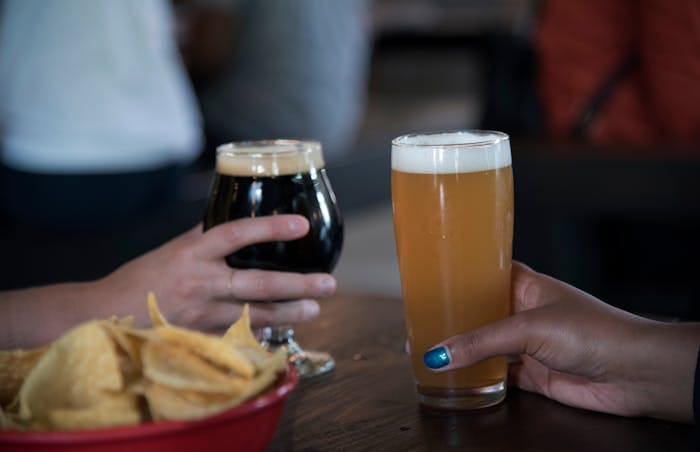Are You Self-Medicating with Drugs or Alcohol?
Think you’re drinking or using drugs in order to make yourself feel better or help manage painful emotions?
There are better, healthier ways to cope with your problems and feelings. This article will cover what exactly self-medicating is and provide ways to channel your emotions more effectively.
What Exactly is Self-Medicating with Drugs or Alcohol?

When you feel stressed or depressed, many of us turn to substances to try to make ourselves feel better. This could be smoking weed before bed to relax, or having a drink or two before going out to reduce nerves and social anxiety.
This use of drugs or alcohol to manage symptoms of any mental health issue or feeling, is known as “self-medicating”. [1]
Self-medicating generally makes you feel better in the moment, but in the long term, it can actually exacerbate your condition and lead to increased mental health problems.
But there are solutions. As soon as you understand the reasons behind why you self-medicate, you can find healthier ways to cope with your problems and improve your well-being.
Forms of Self-Medicating
Alcohol is usually the most common method of self-medication as it’s so widely available and easy to access. It can be used to self-medicate stress, depression and anxiety. However, since it is a depressant, it will only make symptoms worse long-term.
Prescription drugs, such as opioid painkillers or anti-anxiety medication, are also widely available. The uses of prescription drugs are wide-ranging, from numbing pain to increasing focus.
Recreational drugs, including cannabis, marijuana, or stimulants like cocaine, are used to overcome uncomfortable feelings or situations. However, regular use can lead to drug addiction or even overdose.
Signs You’re Self-Medicating with Alcohol or Drugs

It can be difficult to identify when you’re self-medicating, especially since drinking alcohol is socially acceptable, prescription drugs can be found at home, and recreational drugs are easy to access.
To understand if you might be self-medicating, you need to look at the reasons behind why you are drinking or taking drugs.
Signs you might be self-medicating include:
- Turning to drugs or alcohol when you’re feeling stressed, anxious or depressed
- Drugs and alcohol make you feel worse in the long run
- You have to increasingly self-medicate to get the same release
- Your problems are only getting worse
- You constantly think about where to get drugs and alcohol from
- Your loved ones are concerned about your substance use
Dangers of Self-Medicating with Drugs or Alcohol
Self-medicating with drugs or alcohol can cause a multitude of different problems for your mental health, and it risks you becoming addicted to substances. [2]
Risks involved with self-medicating include:
- Making symptoms worse or generating new ones
- Interacting with any existing prescription medication you take and causing unpleasant side effects.
- Triggering new mental health issues
- Delaying you from seeking help by masking your feelings and emotions [3]
How to Find Healthier Ways to Cope

To reduce your reliance on self-medication, there are a number of methods you can adopt.
Increase your social support network
Reaching out for support from friends and loved ones can help to calm your nervous system and ease your stress and anxiety.
Get more exercise
Exercise produces powerful feelings and feel-good hormones such as endorphins and dopamine, which promote your well-being.
It can also be a valuable distraction from the stresses of everyday life.
Practice relaxation techniques
Adopting relaxation techniques such as meditation, deeper breathing or yoga can help you to feel calmer and more positive.
Improve your sleep routine
Often underappreciated, getting a good night’s sleep is one of the best ways to improve your overall well-being.
Not getting enough sleep can make anxiety, depression and stress much more difficult to manage. But by staying on top of better sleep patterns, you can break negative sleeping patterns.
Eat a healthier diet
The food you eat can strongly influence your mood and well-being. Cutting out junk food and eating a more balanced diet with plenty of fruit and vegetables can help improve your energy and have a better outlook on life.
By following these healthier habits, you can live a healthier, balanced life where you feel less of a need to self-medicate with drugs or alcohol.
However, it is important to remember that you may also need professional help if you are struggling with mental health issues or a dependency/addiction that self-care alone won’t alleviate.
Call Rehab Recovery today on 0800 088 66 86 for free, no-obligation guidance, and take the first step towards recovery.
References
[1] https://pmc.ncbi.nlm.nih.gov/articles/PMC6175215/
[3] https://www.verywellmind.com/the-self-medication-theory-of-addiction-21933




